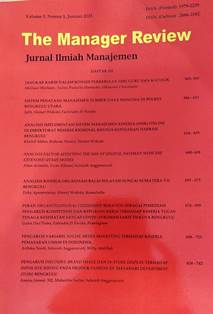Main Article Content
Abstract
This study aims at the performance of the Sumatra VII Bengkulu River Basin Center in terms of the availability of water resources infrastructure and the quality of organizational governance. This type of research uses qualitative descriptive approach research with survey methods. In this study, the authors collected information data and basic information using disseminated questionnaires, interviews and documentation studies. The data to be used in this study is primary data obtained directly from respondents of ASN employees of the Sumatra VII River Basin Center Bengkulu totaling 163 people. Data analysis methods are used, descriptive analysis and qualitative analysis. The results showed that (1) The achievement of the organizational performance of the Sumatra VII Bengkulu River Basin Center in the aspect of providing water resources infrastructure was already in the very high category (AA). The results illustrate that the strategic work program for the provision of water resources infrastructure has been fully implemented; and (2) The achievement of organizational performance of the Sumatra VII River Basin Center Bengkulu from the aspect of the quality of organizational governance is already in the high (AB) and very high (AA) categories. The results illustrate that the quality of organizational governance quality strategic work programs have been implemented and some others are still not optimal.
Keywords: Performance, Water Resources Infrastructure and Quality of Governance
Article Details
Copyright (c) 2023 Deky Agusprawira, Slamet Widodo, Kamaludin Kamaludin

This work is licensed under a Creative Commons Attribution-ShareAlike 4.0 International License.
References
-
Armstrong, M. (2006). A Handook of Human Resource Management : Practice Edition. Kogan Page.
As’ad, M. (2015). Manajemen Personalia dan Sumber Daya Manusia. BPFE- UGM.
Bastian, I. (2006). Sistem Akuntansi Sektor Publik. Salemba Empat.
Creswell, J. W. (2016). Research Design: Pendekatan Metode Kualitatif, Kuantitatif dan Campuran (Edisi Indo). Pustaka Pelajar.
Ghozali, I. (2013). Aplikasi Analisis Multivariate dengan Program IBM SPSS 19
(Edisi 4). BP Undip.
Ghozali, I., & Latan, H. (2015). Partial Least Squares: Konsep, Teknik dan Aplikasi Menggunakan Program SmartPLS 3.0. Semarang: Badan Penerbit Universitas Diponegoro.
Gibson, J. L., Ivancevich, J. M., & Jr, J. H. D. (2010). Organisasi dan Manajemen.
Erlangga.
Handoko, T. H. (2018). Manajemen Sumber Daya Manusia. Andi Offset. Hasibuan, M. S. P. (2013). Manajemen Kinerja dan Produktivitas Kerja. Bumi
Aksara.
Keban, Y. T. (2014). Manajemen Sumber Daya Manusia. Kanisius.
Mahsun, M., Firma, S., & Heribertus, A. P. (2006). Akuntansi Sektor Publik (Edisi 1). BPFE-UGM.
Moeheriono. (2012). Manajemen Sumber Daya Manusia. Prenada Media Group. Moeheriono. (2014). Pengukuran Kinerja Berbasis Kompetensi. Raja Grafindo
Persada.
Robbins, S. P. (2015). Organizational Behavior (9th Editio). Prentice Hall International Inc.
Robbins, S. P., & Judge, T. A. (2008). Perilaku organisasi edisi ke-12. In Chemical and Petroleum Engineering.
Robbins, S. P., & Judge, T. A. (2017). Perilaku Organisasi (Edisi 11). Salemba Empat.
Robbins, S. P., Judge, T. A., Millett, B., & Waters-Marsh, T. (2008). Organisational behaviour . Frenchs Forest. NSW: Pearson Education Australia.
Saint-Onge, H., & Armstrong, C. (2012). The conductive organization. Routledge. Schuller, R. S. (2016). Manajemen Sumber Daya Manusia (Edisi Baha).
Prenhalindo.
Sedarmayanti. (2013). Manajemen Sumber Daya Manusia: Reformasi Birokrasi dan Manajemen Negeri Sipil. Alfabeta.
Sedarmayanti, & Nurliawati, N. (2012). Strategi Penguatan Etika dan Integritas Birokrasi dalam Rangka Pencegahan Korupsi Guna Meningkatkan Kualitas Pelayanan. Jurnal Ilmu Administrasi, 9(3), 337–362.
Sekaran, U. (2006). Research Methods for Business: A Skill Building Approach (4th Editio). Prentice Hall.
Sekaran, U., & Bougie, R. (2017). Metode penelitian untuk bisnis. Jakarta, Indonesia: Salemba Empat.
Sugiyono. (2013). Metode Penelitian Kuantitatif Kualitatif dan R&D.
Sugiyono. (2014). Metode Penelitian Kuantitatif, Kualtatif dan Kombinasi (Mixed Methods). Alfabeta.
Sugiyono. (2016). Metode Penelitian Kuantitatif, Kualitatif dan R&D. Cet. Ke-20.
Bandung: Alfabeta.
Wibowo. (2016). Manajemen Kinerja. Rajawali Press.
References
As’ad, M. (2015). Manajemen Personalia dan Sumber Daya Manusia. BPFE- UGM.
Bastian, I. (2006). Sistem Akuntansi Sektor Publik. Salemba Empat.
Creswell, J. W. (2016). Research Design: Pendekatan Metode Kualitatif, Kuantitatif dan Campuran (Edisi Indo). Pustaka Pelajar.
Ghozali, I. (2013). Aplikasi Analisis Multivariate dengan Program IBM SPSS 19
(Edisi 4). BP Undip.
Ghozali, I., & Latan, H. (2015). Partial Least Squares: Konsep, Teknik dan Aplikasi Menggunakan Program SmartPLS 3.0. Semarang: Badan Penerbit Universitas Diponegoro.
Gibson, J. L., Ivancevich, J. M., & Jr, J. H. D. (2010). Organisasi dan Manajemen.
Erlangga.
Handoko, T. H. (2018). Manajemen Sumber Daya Manusia. Andi Offset. Hasibuan, M. S. P. (2013). Manajemen Kinerja dan Produktivitas Kerja. Bumi
Aksara.
Keban, Y. T. (2014). Manajemen Sumber Daya Manusia. Kanisius.
Mahsun, M., Firma, S., & Heribertus, A. P. (2006). Akuntansi Sektor Publik (Edisi 1). BPFE-UGM.
Moeheriono. (2012). Manajemen Sumber Daya Manusia. Prenada Media Group. Moeheriono. (2014). Pengukuran Kinerja Berbasis Kompetensi. Raja Grafindo
Persada.
Robbins, S. P. (2015). Organizational Behavior (9th Editio). Prentice Hall International Inc.
Robbins, S. P., & Judge, T. A. (2008). Perilaku organisasi edisi ke-12. In Chemical and Petroleum Engineering.
Robbins, S. P., & Judge, T. A. (2017). Perilaku Organisasi (Edisi 11). Salemba Empat.
Robbins, S. P., Judge, T. A., Millett, B., & Waters-Marsh, T. (2008). Organisational behaviour . Frenchs Forest. NSW: Pearson Education Australia.
Saint-Onge, H., & Armstrong, C. (2012). The conductive organization. Routledge. Schuller, R. S. (2016). Manajemen Sumber Daya Manusia (Edisi Baha).
Prenhalindo.
Sedarmayanti. (2013). Manajemen Sumber Daya Manusia: Reformasi Birokrasi dan Manajemen Negeri Sipil. Alfabeta.
Sedarmayanti, & Nurliawati, N. (2012). Strategi Penguatan Etika dan Integritas Birokrasi dalam Rangka Pencegahan Korupsi Guna Meningkatkan Kualitas Pelayanan. Jurnal Ilmu Administrasi, 9(3), 337–362.
Sekaran, U. (2006). Research Methods for Business: A Skill Building Approach (4th Editio). Prentice Hall.
Sekaran, U., & Bougie, R. (2017). Metode penelitian untuk bisnis. Jakarta, Indonesia: Salemba Empat.
Sugiyono. (2013). Metode Penelitian Kuantitatif Kualitatif dan R&D.
Sugiyono. (2014). Metode Penelitian Kuantitatif, Kualtatif dan Kombinasi (Mixed Methods). Alfabeta.
Sugiyono. (2016). Metode Penelitian Kuantitatif, Kualitatif dan R&D. Cet. Ke-20.
Bandung: Alfabeta.
Wibowo. (2016). Manajemen Kinerja. Rajawali Press.
